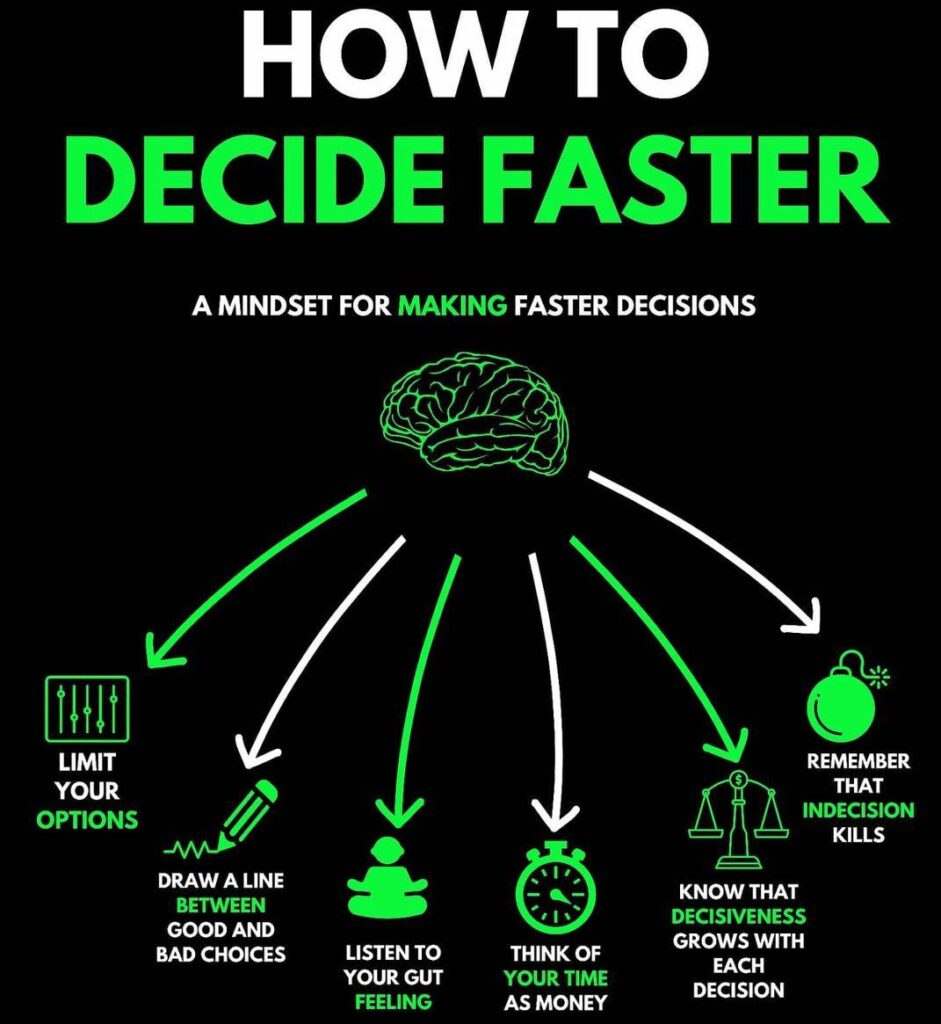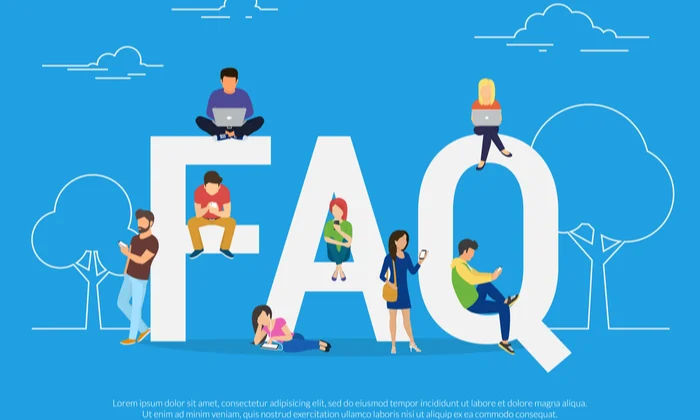How to Make Decision Faster

Making decisions faster involves several practical strategies aimed at streamlining the decision-making process without sacrificing quality. To make faster decisions, it’s crucial to understand the steps and methods you can use during the decision-making process. Some people are brilliant at it and they are hardly wrong, but some of us panic and are unable to make decisions so fast. Making decisions faster seems particularly challenging when life is at its best and time seems short.
What is decision-making?
Table of Contents
Toggle
Decision-making is the process of selecting a course of action or choosing from among alternatives based on available information, preferences, and the expected outcomes of each option. It is a fundamental cognitive process that individuals, groups, or organizations engage in to resolve problems, make choices, and achieve goals.
Effective decision-making is a valuable skill in any workplace, no matter your job.
Having the capability to make good and quick decisions can help you become more productive because it helps you save time and make better use of resources.
Employees face many decisions throughout the workday, so making them quickly but effectively is extremely valuable.
- Flexibility
- Strategy
- Analytical and Critical Thinking
- Problem-Solving
- Team Player
- Active Listening
- Time Management
Why is it important to make faster decisions?
Making faster decisions can benefit both you as an individual and your business. Here are some reasons that making quicker decisions matters:
Seizing Opportunities:
In many situations, opportunities come with a limited window of time. Being able to make decisions quickly allows you to capitalize on these opportunities before they disappear or lose their value.
Competitive Advantage:
In competitive environments, the ability to make faster decisions can differentiate you from others. It can allow your organization to be more agile and responsive to changes in the market or competitive landscape.
Efficiency:
Faster decisions often lead to faster actions, which can streamline processes and reduce delays. This efficiency can result in cost savings and better resource allocation.
Adaptability:
Rapid decision-making is crucial in dynamic environments where conditions can change rapidly. Being able to adapt quickly to new information or circumstances can help you stay ahead or navigate challenges effectively.
Decision Quality:
While speed is important, it’s equally crucial to ensure that decisions are well-informed and considered. However, in many cases, delaying decisions excessively can lead to missed opportunities or indecision, which can be detrimental.
Leadership and Trust:
Leaders who can make timely decisions inspire confidence and trust among their teams and stakeholders. It demonstrates leadership qualities such as decisiveness and clarity of vision.
Reduced chance of decision fatigue:
Decision fatigue refers to exhaustion from spending too much mental or emotional energy trying to make decisions. When you know how to decide with greater efficiency, you decrease the likelihood of experiencing decision fatigue.
How to make fast decisions

Here are a few tips that can help you improve your decision-making skills.
1) Set Clear Goals:
For effective and quick decision-making, you must have an objective in mind. You need a clear, concrete, and specific goal.
When you’re in a situation requiring a super quick decision, having a clear goal in mind ahead of time will make that decision much easier.
Unfortunately, it’s not always easy or even possible to plan things ahead of time. Check the rest of our list to see how to overcome that. Ensure your goals are measurable so that you can track progress and determine when you’ve achieved them.
2) Be an observer:
If you must make a good decision in a short period of time, you don’t have much time to think, let alone set a deadline.
You’ll need to learn to become an observer in situations like these.
You must be able to analyze as much information as possible, and then turn it into action. You can use what you know to make strategic decisions based on the situation.
Be an observer in life, both personally and professionally!
Focus on being conscious and aware within each moment and observe everything and everyone around you.
When you’re paying attention to what you’re facing, you’ll be more likely to make a logical decision.
3) Gather Relevant Information:
Quickly gather the necessary information that is critical to making an informed decision.
Focus on the key facts, data, and insights that will directly impact the decision.
You can quickly gather the necessary information needed to make an informed decision, focusing on key facts, data, and insights that directly impact the outcome.
This approach helps streamline the decision-making process while ensuring you have a solid foundation of information to support your choices effectively.
4) Set a Time Limit:
Sometimes, imposing a deadline for making a decision can help prevent overthinking and procrastination. This can be particularly useful for decisions where a quick response is necessary.
Once the time limit is set, commit to making a decision within that timeframe.
5) Embrace the possibility of failure:
This is probably one of the most important tips we will read. How many times have we backed off from deciding based on the likelihood of failure?
To make quick decisions, you must learn to embrace the possibility of failure, no matter what.
We must normalize it; failure is such an important part of life. It’s how we learn, grow, and become better.
So, if you’re making a decision and it turns out to be completely wrong, that’s ok! Note to self: there is no such thing as failure. There are only lessons.
6) Review your decision:
In this final step, consider the results of your decision and evaluate whether it has resolved the need you identified in Step 1.
If the decision has not met the identified need, you may want to repeat certain steps of the process to make a new decision.
For example, you might want to gather more detailed or somewhat different information or explore additional alternatives.
7) Minimize your emotions:
Try to minimize your personal feelings about the decision. Sometimes you might spend longer making a decision. Because it could affect you, your colleagues or other people in your network.
In general, however, it’s best to focus on objective facts rather than emotions when making business-related choices.
8) Control What you can Control:
At some point, a leader has to wear multiple hats until they have a team to offload responsibility.
It’s important to focus on what is in your direct control.
Worrying about things outside of your control will result in delaying projects.
The more you focus on what you can control, the quicker you will be at making big decisions.
9) Use the common-sense stress test:
After running through a basic cost-benefit analysis, I call one—not five—of my smart friends in a different field who can zoom out and trim the fat off that analysis.
As a company with academic roots, some of our team early on had been prone to consulting every conceivable “expert” for weeks or months without action.
10) Embrace uncertainty:
Startups win by speed, not clairvoyance. When you’re trying to do something new, you won’t have 100 percent of the information you think you need.
There aren’t always industry reports or best practices to adhere to, so accept that you will be wrong 25 percent of the time and try to make as many decisions as possible, followed by execution.
Conclusion
In conclusion, making decisions faster involves a combination of clarity, efficiency, and confidence. By setting clear goals, gathering essential information quickly, and using effective decision-making tools, you can streamline the process. Trusting your instincts when appropriate, setting time limits, and practicing decision-making will further enhance your ability to make swift and effective choices.
Remember, decision-making is a skill that improves with practice and experience. By adopting these strategies, you can cultivate a more agile and decisive approach to navigating the complexities of decision-making in both personal and professional contexts.
General FAQ' s

Making decisions quickly can save time, prevent overthinking, and allow you to capitalize on opportunities before they pass.
Practice making decisions regularly, reflect on past decisions, and learn from both successes and mistakes to refine your approach.
It will mean we can process certain type of changes and applications faster. The Council Tax team receives a high volume of correspondence and as a result applications and information which is processed manually can take up to 4 months for us to deal with.
Having your application processed automatically should allow a decision to be taken within a few days. We hope to speed up our other processes because this will free up officers.
Trust your instincts when you have relevant experience or expertise in the matter. However, balance this with gathering necessary information to make an informed choice.
Avoiding analysis paralysis, over-reliance on intuition without factual backing, and neglecting to consider long-term consequences are crucial to making sound quick decisions.
These answers should provide a foundational understanding of how to approach and improve your ability to make decisions faster and more effectively in various aspects of life.
Strategies like setting clear goals, prioritizing factors, breaking down complex problems, and avoiding overthinking can streamline decision-making and make it more efficient.
Balance speed with prudence by setting clear criteria for your decision, considering alternatives quickly, and evaluating potential consequences.
Yes, if the decision doesn’t require your expertise or immediate attention, delegating can save time and allow you to focus on more critical matters.
